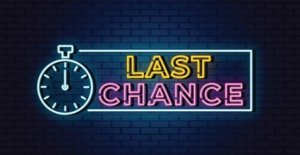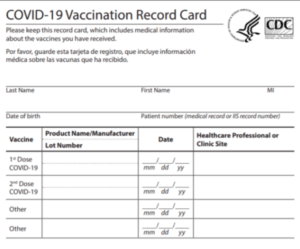By Deborah Hopkins, September 20, 2021
 Executive Order 14043, Requiring Coronavirus Disease 2019 Vaccination for Federal Employees, is currently the basis of a lot of conversations in the Federal employment law world, and beyond. I know it’s a potentially divisive topic, and most people have strong feelings about it. However, FELTG’s focus is not on feelings, but rather on the legal issues related to the EO.
Executive Order 14043, Requiring Coronavirus Disease 2019 Vaccination for Federal Employees, is currently the basis of a lot of conversations in the Federal employment law world, and beyond. I know it’s a potentially divisive topic, and most people have strong feelings about it. However, FELTG’s focus is not on feelings, but rather on the legal issues related to the EO.
Below are three recent questions – and our best attempt at answers based on what we know so far. Please keep in mind the guidance has been changing every few days, so we’ll keep you posted if anything new comes up.
1. What are the “exceptions as required by law” referenced in the Executive Order?
There are two primary areas where legal exceptions might be granted: as reasonable accommodation for disability, and as reasonable accommodation for religion. It’s important to understand the differences between disability accommodation and religious accommodation, as the processes and requirements are entirely different. (Join us October 12 for Handling Pandemic-Related Reasonable Accommodation Requests and Medical Documentation, the first webinar of our three-part series Navigating the Return to the Federal Workplace.) And just because someone has a valid medical reason to not get the vaccine or has a sincere religious belief or practice that prevents them from receiving the vaccine, this DOES NOT mean the agency must waive the vaccine requirement. It merely means the employee is entitled to the RA process to determine whether a reasonable accommodation is available without causing an undue hardship. (Be prepared to address whether allowing an unvaccinated worker to report for duty could cause a direct threat by putting the employee, or co-workers or members of the public, in harm’s way, which is likely an undue hardship.)
Notably, teleworkers and remote workers are NOT exempted from the vaccine mandate. According to updated guidance from the Safer Federal Workforce Task Force (issued last week), “Employees who are on maximum telework or working remotely are not excused from this requirement, including because employees working offsite may interact with the public as part of their duties and agencies may need to recall employees who are on maximum telework or working remotely.” Also, note that political beliefs or personal feelings do not provide a valid reason for legal exemption.
2. Must an employee’s religion explicitly forbid the COVID-19 vaccine for an employee to receive a religious exemption?
Fellow instructor Katie Atkinson and I discussed this topic in a recent FedUpward podcast, and we believe this is going to be an emerging area where agencies will suddenly be inundated with requests; previously religious accommodation requests have not been very common or complicated. In fact, in most agencies there’s not a designated team to assist in religious accommodation requests. We suggest that your agencies train a point person or team to be ready to handle these requests, as such exemptions must be requested by November 22. And because religious accommodation is different than disability accommodation, don’t assume your existing RA team has experience with religious accommodation requests.
Now on to the answer. No doubt you’ve seen media reports of pastors offering religious exemption certificates in exchange for donations to the church, and discussions about whether mainstream religions really forbid the covid vaccine.
For example, Pope Francis publicly stated that the Catholic Church does not forbid the COVID-19 vaccine. He called getting vaccinated “an act of love.” So, here’s an example of what you might see: a request for exemption from an employee who claims their Catholic religion forbids them from receiving the vaccine. Is that a sincere belief even though it’s contrary to mainstream Catholic Church’s stance?
No doubt we will have EEOC cases in the coming years focused on this topic, but here are a few things we already know:
- Title VII defines “religion” to include “all aspects of religious observance and practice as well as belief.” The definition of religion is broad and includes not only traditional, organized religions, but also religious beliefs that are new or uncommon, or that seem illogical or unreasonable to others.
- A religion does not have to be an organized, formal religion, and may include moral and ethical beliefs as to what is right and wrong that are sincerely held with the strength of a traditional religious view. 29 CFR §1605.1.
- Social, political, or economic philosophies, as well as mere personal preferences, are not ‘religious’ beliefs protected by Title VII. EEOC Compliance Manual, Section 12-I, A-2.
- Agencies should ordinarily assume that the employee’s religious beliefs are sincerely held unless there is “an objective basis for questioning either the religious nature or the sincerity of particular belief.” 29 CFR 1605; EEOC Compliance Manual 12-I. (bold added)
- Factors that may indicate a belief is not sincere include:
- Whether employee has behaved in a manner markedly inconsistent with the professed belief
- Whether accommodation sought is a particularly desirable benefit that is likely to be sought for secular reasons
- Whether the timing of the request renders it suspect (e.g., it follows an earlier request by the employee for the same benefit for secular reasons)
- And whether the employer otherwise has reason to believe the accommodation is not sought for religious reasons
EEOC Compliance Manual, Section 12-I, A-2.
As you can see, this area is ripe for potential exploration, perhaps specifically on the sincerity of beliefs. Join us in October for Navigating the Return to the Federal Workplace.
3. If employees refuse the vaccine and don’t qualify for a legal exemption, must agencies use progressive discipline?
I can’t count the number of times in recent days I have seen reports that agencies will or should employ progressive discipline for employees who refuse to get the vaccine. Is progressive discipline (reprimand, suspension, removal) a tool agencies may use in these cases? Yes. Is it mandatory? Unless there’s an agency policy that says so, no. The Task Force guidance says that in cases of employee refusal to be vaccinated agencies “should pursue disciplinary measures, up to and including removal from Federal service.”
As we’ve discussed previously, employees who refuse a mandate to get vaccinated may be removed, even for a first offense. See Mazares, Jr. v. Navy, 302 F.3d 1382 (Fed. Cir. 2002). But some agencies may take the approach that a reprimand and/or suspension should come first, as an attempt to give the employee a chance to correct his misconduct before a removal is proposed.
Be mindful of the charge your agency uses when disciplining an employee for not being vaccinated. Will the agency go with a charge such as “failure to follow instructions” or “refusal to be vaccinated against COVID-19,” or will it choose to look at these cases as “failure to maintain a condition of employment”?
We’ll keep you posted as things continue to develop. Don’t miss the last call for registrations for Federal Workplace 2021: Accountability, Challenges and Trends, where we’ll talk about all this and more. Hopkins@FELTG.com
 Last month, EEOC released updated guidance on whether COVID-19 meets the definition of “disability” under the law. Which raises the question, is a person who has contracted COVID-19 a qualified individual with a disability for the purposes of reasonable accommodation (RA) under the Americans with Disabilities ACT (ADA) and related laws?
Last month, EEOC released updated guidance on whether COVID-19 meets the definition of “disability” under the law. Which raises the question, is a person who has contracted COVID-19 a qualified individual with a disability for the purposes of reasonable accommodation (RA) under the Americans with Disabilities ACT (ADA) and related laws?
 We have long taught that issuing a letter of caution, warning, expectation, concern, and the like can cause more problems for agencies than it’s worth. A supervisor can caution, warn, set an expectation, or express concern for an employee verbally, then follow it up in an email, and achieve the same purpose, while lessening the likelihood of a grievance or complaint being filed. At FELTG, we refer to these types of documents as lesser letters, or more memorably,
We have long taught that issuing a letter of caution, warning, expectation, concern, and the like can cause more problems for agencies than it’s worth. A supervisor can caution, warn, set an expectation, or express concern for an employee verbally, then follow it up in an email, and achieve the same purpose, while lessening the likelihood of a grievance or complaint being filed. At FELTG, we refer to these types of documents as lesser letters, or more memorably,  Equal Employment Opportunity Commission regulations have long required that Federal employees (or applicants) must make a request to initiate precomplaint counseling with an EEO Counselor within 45 days of the effective date of the personnel action, event or matter alleged to be discriminatory. 29 CFR § 1614.105(a)(1). And 29 CFR § 1614.105(a)(2) states that the agency shall dismiss a complaint or a portion of a complaint that fails to comply with the applicable time limits contained in § 1614.105, unless the Agency extends the time limits in accordance with § 1614.604(c).
Equal Employment Opportunity Commission regulations have long required that Federal employees (or applicants) must make a request to initiate precomplaint counseling with an EEO Counselor within 45 days of the effective date of the personnel action, event or matter alleged to be discriminatory. 29 CFR § 1614.105(a)(1). And 29 CFR § 1614.105(a)(2) states that the agency shall dismiss a complaint or a portion of a complaint that fails to comply with the applicable time limits contained in § 1614.105, unless the Agency extends the time limits in accordance with § 1614.604(c). In the
In the  Executive Order 14043, Requiring Coronavirus Disease 2019 Vaccination for Federal Employees, is currently the basis of a lot of conversations in the Federal employment law world, and beyond. I know it’s a potentially divisive topic, and most people have strong feelings about it. However, FELTG’s focus is not on feelings, but rather on the legal issues related to the EO.
Executive Order 14043, Requiring Coronavirus Disease 2019 Vaccination for Federal Employees, is currently the basis of a lot of conversations in the Federal employment law world, and beyond. I know it’s a potentially divisive topic, and most people have strong feelings about it. However, FELTG’s focus is not on feelings, but rather on the legal issues related to the EO. By
By